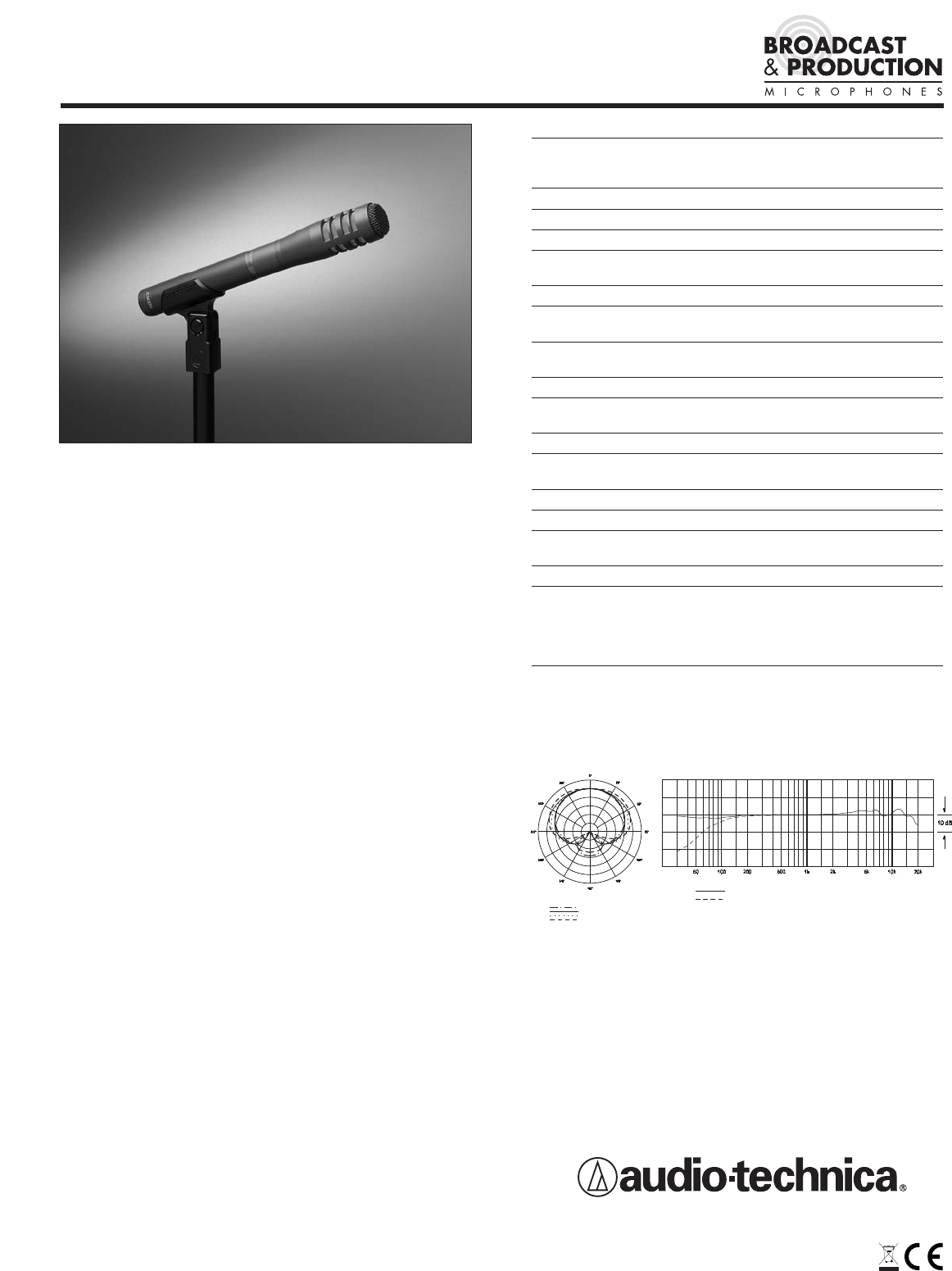
Audio-Technica U.S., Inc., 1221 Commerce Drive, Stow, Ohio 44224
Audio-Technica Limited, Old Lane, Leeds LS11 8AG England
www.audio-technica.com
P51970 ©2007 Audio-Technica U.S., Inc. Printed in Japan
12" or more on axis
LEGEND
Roll-off
Frequency in Hertz
Frequency Response
Response in dB
• All-purpose condenser microphone ideal for handheld interviews
and general audio acquisition
• Cardioid polar pattern reduces pickup of sounds from the sides
and rear, improving isolation of desired sound source
• Switchable 80 Hz high-pass filter minimizes pickup of undesired
low-frequency sounds
• Operates on battery or phantom power
The AT8033 requires 11 to 52V DC phantom power
or a 1.5V AA
battery for operation. A battery need not be in place for phantom
power operation.
Battery installation: Unscrew the lower section of the microphone
body, just below the nameplate. Insert a fresh 1.5V AA battery
in the handle compartment (“+” end up), then reassemble the
microphone. Alkaline batteries are recommended for longest life.
Remove the battery during long-term storage.
Output from the microphone’s XLRM-type connector is low
impedance (Lo-Z) balanced. The signal appears across Pins 2 and
3; Pin 1 is ground (shield). Output phase is “Pin 2 hot” –
positive acoustic pressure produces positive voltage at Pin 2.
To avoid phase cancellation and poor sound, all mic cables must
be wired consistently: Pin 1-to-Pin 1, etc.
An integral 80 Hz high-pass filter provides easy switching from a
flat frequency response to a low-end roll-off. The roll-off position
reduces the pickup of low-frequency ambient noise (such as traffic,
air-handling systems, etc.), room reverberation and mechanically
coupled vibrations.
The high sensitivity of the AT8033 assures useful output and an
excellent match to most input sources. In some cases, however, an
attenuator such as the Audio-Technica AT8202 may be required
between the microphone and preamplifier to avoid overloading
sensitive input stages.
The microphone is RoHS compliant–free from all substances
specified in the EU directive on hazardous substances.
Avoid leaving the microphone in the open sun or in areas where
temperatures exceed 110° F (43° C) for extended periods.
Extremely high humidity should also be avoided.
AT8033 SPECIFICATIONS
†
ELEMENT Fixed-charge back plate
permanently polarized
condenser
POLAR PATTERN Cardioid
FREQUENCY RESPONSE 30-20,000 Hz
LOW FREQUENCY ROLL-OFF 80 Hz, 12 dB/octave
OPEN CIRCUIT SENSITIVITY –44 dB (6.3 mV) /
(Phantom / Battery) –45 dB (5.6 mV) re 1V at 1 Pa*
IMPEDANCE (Phantom / Battery) 250 ohms / 300 ohms
MAXIMUM INPUT SOUND LEVEL 137 dB / 123 dB SPL,
(Phantom / Battery) 1 kHz at 1% T.H.D.
DYNAMIC RANGE (typical) 113 dB / 99 dB,
(Phantom / Battery) 1 kHz at Max SPL
SIGNAL-TO-NOISE RATIO
1
70 dB, 1 kHz at 1 Pa*
PHANTOM POWER 11-52V DC, 2 mA typical
REQUIREMENTS
BATTERY TYPE 1.5V AA/UM3
BATTERY CURRENT / LIFE 0.4 mA / 1200 hours typical
(alkaline)
SWITCH Flat, roll-off
WEIGHT (less accessories) 159 g (5.6 oz)
DIMENSIONS 194.2 mm (7.65") long,
26.0 mm (1.02") head diameter
OUTPUT CONNECTOR Integral 3-pin XLRM-type
ACCESSORIES FURNISHED AT8405a stand clamp for
5
/
8
"-27
threaded stands;
5
/
8
"-27 to
3
/
8
"-16 threaded adapter;
AT8136 windscreen; battery;
soft protective pouch
†
In the interest of standards development, A.T.U.S.offers full details on its test
methods to other industry professionals on request.
*1 Pascal = 10 dynes/cm
2
= 10 microbars = 94 dB SPL
1
Typical, A-weighted, using Audio Precision System One.
Specifications are subject to change without notice.
AT8033
SCALE IS 5 DECIBELS PER DIVISION
Polar Pattern
200 Hz
LEGEND
5 kHz
1 kHz
8 kHz
CARDIOID CONDENSER
MICROPHONE
